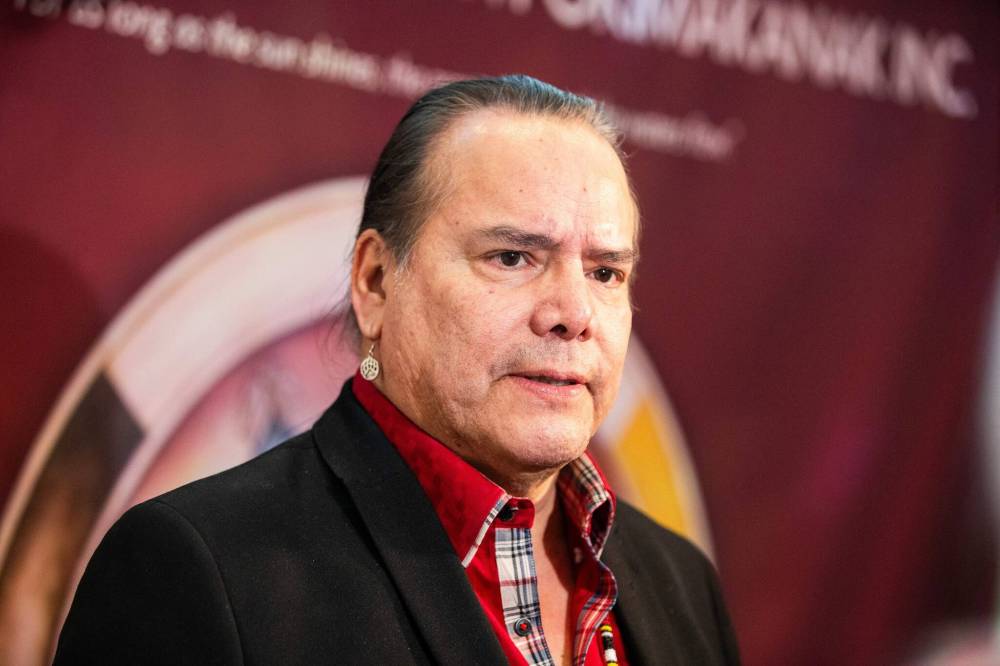Would-be bootleggers flying to a remote Manitoba First Nation will now encounter a warning before they depart.
“Be advised that the Manto Sipi Cree Nation has a by-law in force which prohibits the possession, use or sale of intoxicants on reserve lands,” reads a sign erected at the Perimeter Aviation terminal on Ferry Road Monday.
“You, as well as your carry on baggage and your checked baggage and any freight being shipped, may be searched when you… arrive at your destination.”

MIKAELA MACKENZIE / FREE PRESS FILES
MKO grand chief Garrison Settee, who represents 25 First Nations communities, said MKO is rolling out a “whole-of-government” approach to curbing bootlegging and drug dealing.
The First Nations community, also known as God’s River, is engaged in a two-year pilot project to the enhance enforcement abilities of its First Nations safety officers, Indigenous advocacy group Manitoba Keewatinowi Okimakanak said in a news release.
Under an updated agreement with Justice Minister Matt Wiebe, signed July 8, safety officers will be permitted to conduct searches at the God’s River Airport and areas beyond the reserve lands, including on the community’s winter road and trapline, it said.
“The only way that alcohol and drugs can get to our remote community at God’s River right now is by being brought in by passengers in their carry-ons and (checked) luggage and in the cargo and mail carried by the airlines,” Manto Sipi Chief Michael Yellowback said.
“It is essential that RCMP, our First Nation safety officers and airlines like Perimeter do everything possible to stop the flow of alcohol and illicit drugs.”
People caught entering Manto Sipi with banned substances may face a $2,500 fine. A second sign warning of the offence is posted at the community’s airport, so no one can claim they were unaware of the prohibition, Yellowback said.
RCMP Supt. Gord Corbett said the police force is “dedicated to working with all partners to enhance the safety and security of First Nations communities across Manitoba.”
“We are very thankful for the continued dialogue, partnership and collaboration with MKO and Manto Sipi Cree Nation, as we recognize that it’s only by working together that we can make a difference.”
MKO Grand Chief Garrison Settee, who represents 25 Indigenous communities in Manitoba, said the sign was the “first of many more to come” as his organization rolls out a “whole-of-government response” to “stem the epidemic of bootlegging and drug-dealing” and improve First Nations safety.
MKO has prepared a multi-phase plan in partnership with Manitoba Justice, RCMP, the Public Prosecution Service of Canada, Indigenous Services Canada, Justice Canada and Canada Post, he said.
An outline of the plan, issued with the release, includes introducing a self-administered police service through MKO. It also details a slate of possible improvements and changes to provincial and federal prosecution laws and legal services.
The plan also mentions the potential for private prosecutions in specific cases, in-community adjudication and improvements to restorative justice initiatives.
Settee said the enhanced enforcement capabilities provided to Manto Sipi safety officers will provide a framework for MKO First Nations.
“The chief and council of every single MKO First Nation which is served by an airport has been urgently calling for their First Nation safety officers to be empowered,” he said.
“We must take concrete action to prevent the harms that alcohol and drugs cause and that can touch every single family and person in our communities.”
Monday’s announcement comes in the wake of cries for help from some Indigenous communities in northern Manitoba.
MKO said during a news conference in August that it has seen a 40 per cent increase in violent acts in the communities it represents since 2021.
O-Pipon-Na-Piwin Cree Nation (South Indian Lake), Nisichawayasihk Cree Nation (Nelson House), Chemawawin Cree Nation (Easterville), Tastaskweyak Cree Nation (Split Lake), Peguis First Nation, Long Plain First Nation and Shamattawa First Nation have all declared states of emergency this year relating to violence, addictions and illegal activities.
MKO previously called on the government to impose stricter regulations on how much alcohol an individual can buy without a permit, suggesting an excessively large liquor purchase could be an indication of bootlegging.
The province said there are such limits in place at some liquor vendors in northern Manitoba, including Leaf Rapids, Lynn Lake, Wabowden, Snow Lake, Gillam and Riverton, as well as at provincially owned Liquor Marts in The Pas and Thompson.
They don’t apply in Winnipeg.
tyler.searle@freepress.mb.ca

Tyler Searle
Reporter
Tyler Searle is a multimedia producer who writes for the Free Press‘s city desk. A graduate of Red River College Polytechnic’s creative communications program, he wrote for the Stonewall Teulon Tribune, Selkirk Record and Express Weekly News before joining the paper in 2022. Read more about Tyler.
Every piece of reporting Tyler produces is reviewed by an editing team before it is posted online or published in print — part of the Free Press‘s tradition, since 1872, of producing reliable independent journalism. Read more about Free Press’s history and mandate, and learn how our newsroom operates.
Our newsroom depends on a growing audience of readers to power our journalism. If you are not a paid reader, please consider becoming a subscriber.
Our newsroom depends on its audience of readers to power our journalism. Thank you for your support.